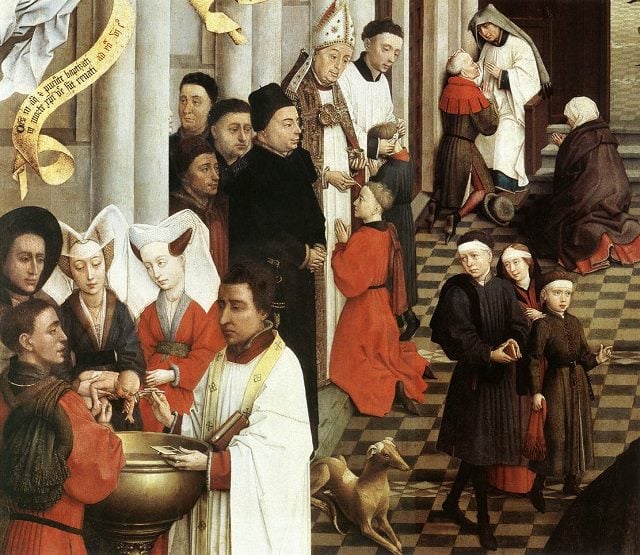1) St. Augustine [354-430] believed in the Real Presence of Jesus Christ in the Holy Eucharist:
I promised you [new Christians], who have now been baptized, a sermon in which I would explain the sacrament of the Lord’s Table. . . . That bread which you see on the altar, having been sanctified by the word of God, is the body of Christ. That chalice, or rather, what is in that chalice, having been sanctified by the word of God, is the blood of Christ.
(Sermons 227 [A.D. 411])
What you see is the bread and the chalice; that is what your own eyes report to you. But what your faith obliges you to accept is that the bread is the body of Christ and the chalice is the blood of Christ. This has been said very briefly, which may perhaps be sufficient for faith; yet faith does not desire instruction.
(Ibid., 272)
2) He held to baptismal regeneration:
It is an excellent thing that the Punic [North African] Christians call baptism salvation and the sacrament of Christ’s body nothing else than life. Whence does this derive, except from an ancient and, as I suppose, apostolic tradition, by which the churches of Christ hold inherently that without baptism and participation at the table of the Lord it is impossible for any man to attain either to the kingdom of God or to salvation and life eternal? This is the witness of Scripture too.
(Forgiveness and the Just Deserts of Sin, and the Baptism of Infants 1:24:34 [A.D. 412])
The sacrament of baptism is most assuredly the sacrament of regeneration.
(Ibid., 2:27:43)
Baptism washes away all, absolutely all, our sins, whether of deed, word, or thought, whether sins original or added, whether knowingly or unknowingly contracted.
(Against Two Letters of the Pelagians 3:3:5 [A.D. 420])
This is the meaning of the great sacrament of baptism, which is celebrated among us: all who attain to this grace die thereby to sin—as he himself [Jesus] is said to have died to sin because he died in the flesh (that is, ‘in the likeness of sin’)—and they are thereby alive by being reborn in the baptismal font, just as he rose again from the sepulcher. This is the case no matter what the age of the body. For whether it be a newborn infant or a decrepit old man—since no one should be barred from baptism—just so, there is no one who does not die to sin in baptism. Infants die to original sin only; adults, to all those sins which they have added, through their evil living, to the burden they brought with them at birth.
(Handbook on Faith, Hope, and Love 13[41] [A.D. 421])
3) He adhered to the sacrament of confession (reconciliation) and absolution and penance:
When you shall have been baptized, keep to a good life in the commandments of God so that you may preserve your baptism to the very end. I do not tell you that you will live here without sin, but they are venial sins which this life is never without. Baptism was instituted for all sins. For light sins, without which we cannot live, prayer was instituted. . . . But do not commit those sins on account of which you would have to be separated from the body of Christ. Perish the thought! For those whom you see doing penance have committed crimes, either adultery or some other enormities. That is why they are doing penance. If their sins were light, daily prayer would suffice to blot them out. . . . In the Church, therefore, there are three ways in which sins are forgiven: in baptisms, in prayer, and in the greater humility of penance.
(Sermon to Catechumens on the Creed 7:15, 8:16 [A.D. 395])
St. Augustine (d. 430) warns the faithful: “Let us not listen to those who deny that the Church of God has power to forgive all sins” (De agon. Christ., iii). . . .
St. Augustine . . . tells the sinner: “an abscess had formed in your conscience; it tormented you and gave you no rest. . . . confess, and in confession let the pus come out and flow away” (Enarration on Psalm 66, no. 6). . . .
For those who sought to escape the obligation of confession it was natural enough to assert that repentance was the affair of the soul alone with its Maker, and that no intermediary was needed. It is this pretext that St. Augustine sweeps aside in one of his sermons: “Let no one say I do penance secretly; I perform it in the sight of God, and He who is to pardon me knows that in my heart I repent”. Whereupon St. Augustine asks: “Was it then said to no purpose, ‘What you shall loose upon earth shall be loosed in heaven?’ Was it for nothing that the keys were given to the Church?” (Sermo cccxcii, n. 3, in P.L., XXXIX, 1711). . . .
“Man is forced to suffer even after his sins are forgiven, though it was sin that brought down on him this penalty. For the punishment outlasts the guilt, lest the guilt should be thought slight if with its forgiveness the punishment also came to an end” (Tractate 124 on the Gospel of John, no. 5) . . .
The name of penitent was applied especially to those who performed public canonical penance. “There is a harder and more grievous penance, the doers of which are properly called in the Church penitents; they are excluded from participation in the sacraments of the altar, lest by unworthily receiving they eat and drink judgment unto themselves “(St. Augustine, “De utilitate agendae poenit.”, ser. cccxxxii, c. iii). . . .
Public penance did not necessarily include a public avowal of sin. As St. Augustine also declares, “If his sin is not only grievous in itself, but involves scandal given to others, and if the bishop [antistes] judges that it will be useful to the Church [to have the sin published], let not the sinner refuse to do penance in the sight of many or even of the people at large, let him not resist, nor through shame add to his mortal wound a greater evil” (Sermo cli, n. 3). . . .
“Although, by a wise and salutary provision, opportunity for performing that humblest kind of penance is granted but once in the Church, lest the remedy, become common, should be less efficacious for the sick . . . yet who will dare to say to God: Wherefore dost thou once more spare this man who after a first penance has again bound himself in the fetters of sin?” (Ep. cliii, “Ad Macedonium”).
(The Catholic Encyclopedia, “Sacrament of Penance”)
4) He accepted the sacrament of matrimony:
Undoubtedly the substance of the sacrament is of this bond, so that when man and woman have been joined in marriage they must continue inseparably as long as they live, nor is it allowed for one spouse to be separated from the other except for cause of fornication. For this is preserved in the case of Christ and the Church, so that, as a living one with a living one, there is no divorce, no separation forever.
(Marriage and Concupiscence 1:10:11 [A.D. 419])
In marriage, however, let the blessings of marriage be loved: offspring, fidelity, and the sacramental bond. Offspring, not so much because it may be born, but because it can be reborn; for it is born to punishment unless it be reborn to life. Fidelity, but not such as even the unbelievers have among themselves, ardent as they are for the flesh. . . . The sacramental bond, which they lose neither through separation nor through adultery, this the spouses should guard chastely and harmoniously.
(Ibid., 1:17:19)
Hence, whoever attributes these elements to Christian marriage, thereby declares it a true sacrament in the strict sense of the word. Testimony to this effect is to be found from the earliest Christian times onward. The clearest is that of St. Augustine in his works “De bono conjugii” and “De nuptiis et concupiscentia”. In the former work (chapter 24), he says, “Among all people and all men the good that is secured by marriage consists in the offspring and in the chastity of married fidelity; but, in the case of God’s people [the Christians], it consists moreover in the holiness of the sacrament, by reason of which it is forbidden, even after a separation has taken place, to marry another as long as the first partner lives . . . just as priests are ordained to draw together a Christian community, and even though no such community be formed, the Sacrament of Orders still abides in those ordained, or just as the Sacrament of the Lord, once it is conferred, abides even in one who is dismissed from his office on account of guilt, although in such a one it abides unto judgment.” . . . St. Augustine places marriage, which he names a sacrament, on the same level with Baptism and Holy Orders. Thus, as Baptism and Holy Orders are sacraments in the strict sense and are recognized as such by the Holy Doctor, he also considers the marriage of Christians a sacrament in the full and strict sense of the word.
(The Catholic Encyclopedia, “Sacrament of Marriage”)
5) He believed in the sacrament of confirmation:
Why, therefore, is the Head itself, whence that ointment of unity descended, that is, the spiritual fragrance of brotherly love,–why, I say, is the Head itself exposed to your resistance, while it testifies and declares that “repentance and remission of sins should be preached in His name among all nations, beginning at Jerusalem”? And by this ointment you wish the sacrament of chrism to be understood, which is indeed holy as among the class of visible signs, like baptism itself.
(Letters of Petilian the Donatist, 2,104:239 [A.D. 403], in NPNF 1, IV:592)
St. Augustine explains how the coming of the Holy Ghost was companied with the gift of tongues in the first ages of the Church. “These were miracles suited to the times . . . . Is it now expected that they upon whom hands are laid, should speak with tongues? Or when we imposed our hand upon these children, did each of you wait to see whether they would speak with tongues? and when he saw that they did not speak with tongues, was any of you so perverse of heart as to say ‘These have not received the Holy Ghost?’ (Tractate 6 on the Gospel of John).
He also speaks in the same way about anointing: the sacrament of chrism “is in the genus of visible signs, sacrosanct like baptism” (Against Petilian 2.104; see Serm. ccxxvii, Ad Infantes in P.L., XXXVII, col. 1100; On the Holy Trinity 15.46); “Of Christ it is written in the Acts of the Apostles, how God anointed Him with the Holy Ghost, not indeed with visible oil, but with the gift of grace, which is signified by that visible unction wherewith the Church anoints the baptized”.
(The Catholic Encyclopedia, “Confirmation”)
6) . . . and the sacrament of Holy Orders or ordination:
In like manner as if there take place an ordination of clergy in order to form a congregation of people, although the congregation of people follow not, yet there remains in the ordained persons the Sacrament of Ordination; and if, for any fault, any be removed from his office, he will not be without the Sacrament of the Lord once for all set upon him, albeit continuing unto condemnation.
(On the Good of Marriage, 24:32 [A.D. 401], in NPNF1, III:412)
St. Augustine, speaking about baptism and order, says, “Each is a sacrament, and each is given by a certain consecration, . . . If both are sacraments, which no one doubts, how is the one not lost (by defection from the Church) and the other lost?” (Contra. Epist. Parmen., ii, 28-30).
(The Catholic Encyclopedia, “Holy Orders”)
7) Lastly, he upheld the sacrament of extreme unction or anointing or “last rites”:
In St. Augustine’s Speculum de Scripturâ (an. 427); in P.L., XXXIV, 887-1040), which is made up almost entirely of Scriptural texts, without comment by the compiler, and is intended as a handy manual of Christianpiety, doctrinal and practical, the injunction of St. James regarding the prayer-unction of the sick is quoted. This shows that the rite was a commonplace in the Christian practice of that age; and we are told by Possidius, in his Life of Augustine (c. xxvii, in P.L., XXXII, 56), that the saint himself “followed the rule laid down by the Apostle that he should visit only orphans and widows in their tribulation (James 1:27), and that if he happened to be asked by the sick to pray to the Lord for them and impose hands on them, he did so without delay” . . . It is fair, then, to conclude from the biographer’s statement that, when called upon to do so, St. Augustine himself used to administer the Jacobean unction to the sick.
(The Catholic Encyclopedia, “Extreme Unction”)


















